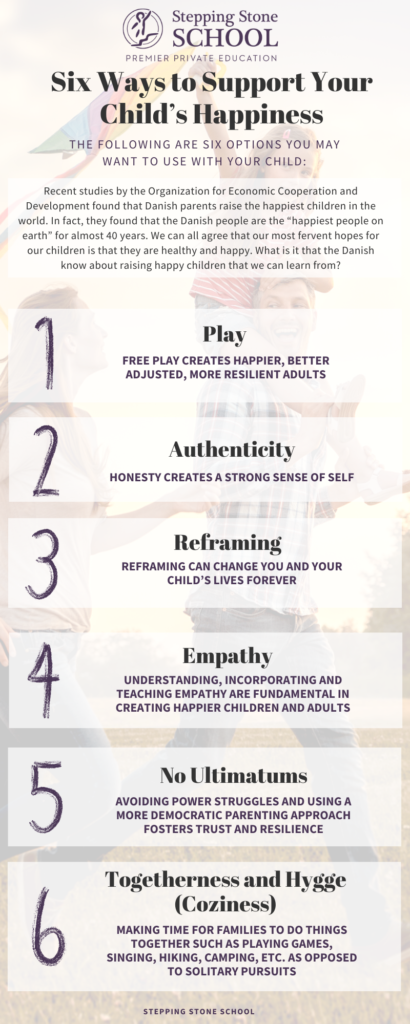Six Ways to Support Your Child’s Happiness
Recent studies by the Organization for Economic Cooperation and Development found that Danish parents raise the happiest children in the world. In fact, they found that the Danish people are the “happiest people on earth” for almost 40 years. We can all agree that our most fervent hopes for our children is that they are healthy and happy. What is it that the Danish know about raising happy children that we can learn from?
Danish culture continues to raise children who are resilient and emotionally mature. Danish parents actively teach their children empathy and to value others. They base their success on real teamwork, rather than only striving to be the star. They work more on building a child’s self-esteem, rather than self-confidence. They build a sturdy foundation rooted firmly in empathy which is what brings true happiness and well being to us all.
The following are six options you may want to use with your child:
Play – Free play creates happier, better adjusted, more resilient adults
Authenticity – Honesty creates a strong sense of self
Reframing – Reframing can change you and your child’s lives forever
Empathy – Understanding, incorporating and teaching empathy are fundamental in creating happier children and adults
No Ultimatums – Avoiding power struggles and using a more democratic parenting approach fosters trust and resilience
Togetherness and Hygge (Coziness) – Making time for families to do things together such as playing games, singing, hiking, camping, etc. as opposed to solitary pursuits

Lev Vygotsky, an early researcher and leader in child development created the idea of the Zone of Proximal Development (ZDP). He hypothesized that children need the right amount of space to learn and grow. He found that during play, children develop the competence and confidence to feel they oversee their own challenges and development. They learn to cope with daily stress through social interactions which cultivates resilience. Additional studies have found a direct positive correlation between playfulness levels and the ability to cope with stress
Tips for encouraging the Zone of Proximal Development through play in your children:
- Turn it off – turn off or limit tech, allow children to use their imaginations
- Create an enriching environment –provide a variety of materials to stimulate senses
- Use art– open ended art supports brain development
- Explore outside– spend time outdoors playing and imagining
- Mix children of different ages– allow one child to facilitate the learning of another child
- Freedom– child led play is essential
- Be real– participate in children’s play, do not be afraid to look silly
- Avoid interfering too quickly– let children figure things out for themselves
Parenting with authenticity means modeling emotional health and wellbeing. Children should be allowed to express emotion and learn how to regulate their emotions. It is important to be honest and allow children to see what you do when you are upset or unhappy and how you regulate yourself. Talk about and model your emotions.
Authentic praise helps children see the process they go through to achieve goals. Parents should explain, “You reached the goal because you practiced consistently.”
A study by Carol Dweck found the following, children who were praised “You are so smart” when completing a task were less likely to try a more challenging task. Children who were praised for their process were likely to attempt more challenging tasks and continued to problem solve to complete those tasks.
Framing is our perception of the world or what we perceive as the truth. Reframing allows you to see the truth in a new, more positive way. Modeling this behavior provides your children with the opportunity to see things through a positive lens.
Realistic optimism is the process of filtering out unnecessary negative information. It is important to avoid negative words and occurrences and develop a habit of interpreting situations in a more positive manner. Try Focusing less on the negative aspects of situations and find a middle ground.
 Reframing leads to resilience. Studies show that when we deliberately reinterpret an event to feel better about it, it decreases the activity in the areas of the brain involved in the processing of negative emotions and increased activity in areas of the brain involved in cognitive control and integration.
Reframing leads to resilience. Studies show that when we deliberately reinterpret an event to feel better about it, it decreases the activity in the areas of the brain involved in the processing of negative emotions and increased activity in areas of the brain involved in cognitive control and integration.
Practicing reframing and realistic optimism in our own daily lives, will model these traits for our children to ensure they develop emotional health and wellbeing.
To learn more about our Kindness and Empathy Curriculum™ click here